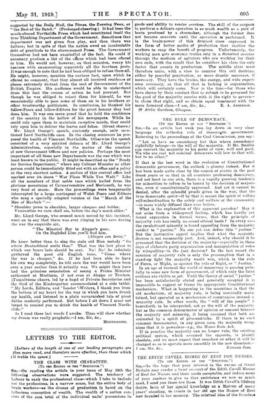THE RULE OF DEMOCRACY.
[To THE EDITOR or rue " SPECTAT0/1."]
Sic,—In an article last week you lay down in very clear language the orthodox role of democratic government. Referring to the proceedings of the Coal Commission, you say : " Let us have no ascendancy but that where ascendancy rightfully belongs—to the will of the majority. If Mr. Smillie can convert the majority to his point of view, well and good. We who are real not nominal democrats will bow to that will, but to no other," If that is the last word in the evolution of Constitutional democratic government, the outlook is .gloomy indeed. For it has been made quite clear by the course of events in the past dozen years or an that in all countries professing democracy, and not least in our own, there is a rapidly growing tendency for minorities to refuse to be bound by the decision of majori- ties, even if constitutionally expressed. And yet it cannot be denied, after the splendid proofs given in the war, that the true democratic spirit—if by that is meant the spirit of willing self-subordination to the safety and welfare of the community is more widely diffused than ever before.
What is the explanation of this apparent paradox? May it not arise from a widespread feeling, which has hardly yet found expression in formal terms, that the principle of majority rule has really no sound ethical basis ? In every case the recalcitrant minority ie found appealing from the majority verdict to "justice." No one yet can define this " justice." But the instinctive appeal implies that what the majority decrees is not necessarily just. And, indeed, why should it be presumed that the decision of the majority—especially in these days of elaborate party organization and manipulation of votes by wirepulling—is the just decision? In the last resort the sanction of majority rule is only the presumption that in a stand-up fight the majority would win, which is the rule of Force, or Might, as against tho rule of Right, or " Justice." In an age of turmoil the world of democracy is passing pain- fully to some new form of government, of which only the faint outlines are visible as yet. Until the theory of social " justice " has been satisfactorily stated and generally accepted it is impossible to suggest or frame its appropriate Constitutional mechanism. What is happening in the meantime is that the old mechanism, of majority rule, is being nominally main tabled, but operated as a mechanism of compromise instead o majority rule. In other words, the " will of the people" it henceforth to be interpreted, not as the will of the majority but as the common denominator of opinion or consent between the majority and minority, it being assumed that both are animated by a spirit of give-and-take. If there is no such common denominator, in any given case, the majority recog• Mess that it is powerless—e.g., the Home Rule Act.
If in practice the majority can no longer rule, the existing political system, which assumed the opposite, is plainly obsolete, and we must expect that somehow or other it will be changed so as to operate more smoothly in the new direction.-


































 Previous page
Previous page